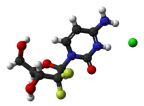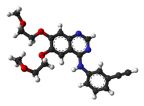Gemcitabine and Erlotinib Both Effective Maintenance Therapies in NSCLC
Maintenance therapy with both gemcitabine and erlotinib improved progression-free survival in patients with non–small-cell lung cancer who were initially treated with cisplatin-gemcitabine induction chemotherapy, according to a new phase III trial.
Maintenance therapy with either gemcitabine or erlotinib improved progression-free survival in patients with non–small-cell lung cancer (NSCLC) who were initially treated with cisplatin/gemcitabine induction chemotherapy, according to a new phase III trial.

Chemical structure of gemcitabine
“Maintenance therapy in advanced NSCLC is now validated by several phase III studies and meta-analyses, showing a significant benefit in terms of progression-free survival and now in terms of overall survival,” said the study’s lead author Maurice Prol, MD, of the Mdicale Centre Lon Brard in Lyon, France, in an e-mail to Cancer Network.
Prol and colleagues wrote in the Journal of Clinical Oncology that only two-thirds of patients who achieve an objective response or disease stabilization after platinum-based doublet therapy go on to receive a second-line, maintenance treatment, representing what could be a lost opportunity to improve survival. In the new phase III trial, 464 patients with advanced NSCLC were randomized to an observation control group (155 patients), a continuation maintenance therapy arm with gemcitabine (154 patients), or a switch maintenance group that received erlotinib (155 patients).

Chemical structure of erlotinib
Both of the maintenance therapies improved progression-free survival over observation. Patients who received gemcitabine had a median progression-free survival of 3.8 months vs 1.9 for observation, for a hazard ratio for progression of 0.56 (95% CI, 0.44-0.72; P < .001). The progression-free survival in the erlotinib group was 2.9 months vs the 1.9 months for observation patients for an HR of 0.69 (95% CI, 0.54-0.88; P = .003). Subgroup analyses showed benefit across subgroups, though there were trends toward increased value in gemcitabine patients who received second-line pemetrexed and among those who achieved an objective response to gemcitabine/cisplatin induction. In the erlotinib group, there were trends toward larger benefit among never-smokers and those who received second-line pemetrexed.
Of the 464 randomized patients, 355 died during the study; progression-free survival improvement did not translate to a significant overall survival advantage. The median overall survival was 12.1 months in the gemcitabine group and 11.4 months in the erlotinib group, neither of which were significantly better than the 10.8 months in the observation alone group. Both maintenance therapy groups did show greater overall survival benefit in those with a performance status of 0 and those who received second-line pemetrexed.
Prol said this study confirms the improved duration of disease control with either of the two therapies, and that gemcitabine should be considered for patients who respond to cisplatin/gemcitabine induction therapy. Erlotinib is likely best suited for those who experience significant toxicities with the induction regimen. Prol also noted that his group has recently initiated a phase III study in advanced non–squamous cell carcinoma patients looking into whether response to induction chemotherapy should be used to determine specific maintenance treatment. A control group will receive pemetrexed continuation maintenance therapy after cisplatin/pemetrexed induction, while the experimental group will receive cisplatin/gemcitabine induction therapy followed by gemcitabine in responders and pemetrexed in those with only stable disease.